Ex Machina
 for graphic nudity, language, sexual references and some violence.
for graphic nudity, language, sexual references and some violence.
Reviewed by: David Criswell, Ph.D.
CONTRIBUTOR
| Moral Rating: | Very Offensive |
| Moviemaking Quality: |
|
| Primary Audience: | Adults |
| Genre: | Sci-Fi Thriller Drama |
| Length: | 1 hr. 50 min. |
| Year of Release: | 2015 |
| USA Release: |
April 10, 2015 (limited) April 24, 2015 (wide) DVD: July 14, 2015 |
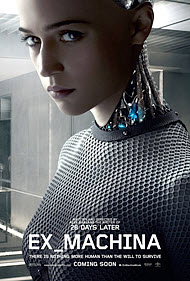




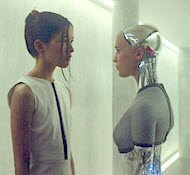
artificial intelligence and android robots
consciousness and robotics
What is a soul?
THE FIRST MAN— What was Adam really like?
more about ADAM


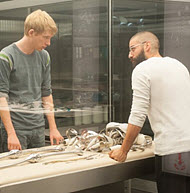
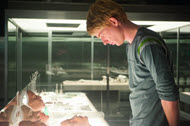
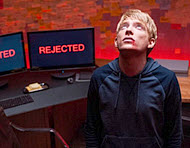
| Featuring |
|---|
|
Alicia Vikander … Ava Domhnall Gleeson … Caleb Oscar Isaac … Nathan Sonoya Mizuno … Kyoko Chelsea Li … Office girl Evie Wray … Secretary Corey Johnson … Helicopter Pilot Symara A. Templeman … Jasmine Deborah Rosan … Office Manager Elina Alminas … Amber Claire Selby … Lily Ramzan Miah … Secretary Johanna Thea … Office Worker |
| Director |
|
Alex Garland |
| Producer |
|
DNA Films Film4 |
| Distributor |
The film’s title is pronounced ex mock-in-uh.
Critics have been calling “Ex Machina” a “cerebral movie,” but that is an oxymoron. Movies by their very nature are visual, not intellectual. They are about entertainment. Too often, when a movie tries to be cerebral, it becomes a boring movie full of people talking incessantly. “Ex Machina” is a film which tries to be both. It tries to be both cerebral and entertaining. Some claim that it has succeeded, but those of us who believe that man was created unique by God will not.
“Ex Machina” is about Artificial Intelligence. It asks whether man can create a robot that is more real than humans. In short, can man “create” artificial life. The very question itself assumes that man has no real soul. Indeed, atheist Isaac Asimov first popularized the notion of a human robot with the idea that “I think, therefore I am,” but is there more to being human than thinking? Are we more than evolved animals? These questions are not even asked by the film, although they underlie its very premise.
In the film, Caleb Smith (Domhnall Gleeson) is a computer programmer who “wins” a free week with a master computer engineer and millionaire owner of his company, Nathan Bateman (Oscar Isaac). The real reason for his visit, however, is that Nathan needs an “objective” opinion to determine whether or not he has created the world’s first true A.I.
Caleb is then introduced to Ava (Alicia Vikander — “Seventh Son”), an android with a perfect human-looking face, and an hourglass figure. It does not take long before Ava begins to act as if she is in love with Caleb, but he starts to wonder if she is really capable of love or if she is just pretending to love him in order to pass the A.I. test. Was she programmed to emulate love, or is she truly in love.
It becomes apparent that Caleb was not chosen at random, but rather that he was chosen because he is a lonely geek who has no women of his own. Soon, we begin to wonder who is being manipulated, and even Caleb begins to question his own identity.
Cinematic Review
This is a film which is impossible to review without spoilers. Since there are few major spoilers in the film, I feel this is safe, but the reader may choose to skip to the summary section if they wish…
The first thing to note about the film is that it based on a secular presupposition—namely, that man’s soul is nothing more than an intelligent brain programmed by society, culture, or other factors. The concept of a divinely created soul is never mentioned in the film, but one thing I did notice is that Caleb is drawn to Ava’s apparent capability to love. Indeed, only a true soul is capable of true love, but is Ava just pretending to love? The answer appears at the end of the film, and herein lies the spoiler.
Ava wants to escape from her captor, who is also her creator. It becomes clear that Nathan is a perverted narcissist and Ava wants to live. She has been playing Caleb to get her freedom, but when she is free she promptly murders Nathan and leaves Caleb to die after cutting power to a sealed room he is in. Caleb was just a tool. Ava is incapable of love. At least this is what I read into the film. It is not clear, however, whether or not the writer believes this. Throughout the film, he seems to imply that independent thought is the basis for life and a true A.I. More disturbing are the underlying sexual themes.
Ava’s creator is the narcissistic megalomaniac Nathan. He fancies himself a “god” but behaves like a teenage boy. It is apparent that his androids are built in large part to satisfy his sexual perversions… and he makes it clear that they have been programmed for sex. The Freudian overtones in the film are overt and ignore the true purpose for sex and sexuality as created by God. Sex, like love, is a tool for both Ava and Nathan.
The film itself is well made and manages to keep the audience’s interest, despite its long “talkie” or “cerebral” nature. Although the plot twists are largely predictable to science fiction aficionados, they are well done and effective. What is not, however, is the fact that the film is predictable, Freudian, and thoroughly secular, despite what is inherently a religious topic—the true nature of life itself.
Comparison’s to Frankenstein are warranted, including its Luciferic subplot, but, unlike Frankenstein, “Ex Machina” never captured my imagination. We are left staring at a sexually charged android through glass, wondering if she is really in love. By the time we find out, we already knew.
Objectionable Content
The most obvious is the overt sexual nature of the film. Full frontal nudity, including the strange fad of shaving private areas, is seen in many scenes, as Nathan’s android collection is revealed. Although there is no sex on screen, sex, devoid of love or marriage, is put on display. In one scene, Nathan asks Caleb, “When did you choose to be heterosexual?” Ironically, he implies that sexuality is not genetic (and no definite evidence has ever existed that homosexuality is genetic), but he then proceeds to promote the popular myth that bisexuality is the norm and that “society” programs our sexuality. Such false and perverse teachings, contrary to everything nature teaches us, only serves to illustrate the cold unfeeling approach to sex which the film promotes.
There is a lot of foul language in the film, much of it sexual in nature. I could not count the number of words, and don’t usually try, but they are plentiful, including the f-word, c-word, and many others.
Also, apparent is violence. While there are only a few violent scenes, they are done in a disturbing manner. In one scene, Caleb starts to suspect his own humanity and cuts open his wrist to see if he is real. The more violent scene is the murder of Nathan. Although not done in a gory fashion, it is the cold and brutal manner that makes the scene disturbing.
The film is not only blasphemous in its general vein, but Nathan himself calls himself a god, believing that he has created a being greater than man.
Summary
“Ex Machina” is a low brow Frankenstein, rewritten for the era of computers and the mythical notion of “Artificial Intelligence.” It borrows some Biblical imagery, such as Ava’s name (Ava is a different Anglicization of Eve), but ignores religion altogether. It is a purely secular Darwinistic view of life. The film seems to argue that man can create life which is superior to himself. It is also indwelled with an overt Freudian theme that makes sex nothing more than an animal instinct to be used for selfish gratification. People, and machines, are tools to be used.
I cannot recommend this film. While technically well made, it is slow paced, predictable, immoral, and somewhat blasphemous. Perhaps the most disturbing thing about the film is the bleakness which atheism and a purely secular view of life creates. If you see this film, you will likely leave the theater feeling spiritually empty and drained.
Violence: Heavy / Profanity: Heavy—“Jesus Christ” (2), OMG (2), damn (2), f-words (25+), s-words (5) / Sex/Nudity: Extreme
See list of Relevant Issues—questions-and-answers.


Events happen that make you question whom you should trust and who is really testing/playing whom. I think the film contrasts/complements the advanced future-technology of the artificial intelligence with the natural background of the green trees where everything takes place, or maybe it’s trying to evoke some sort of Edenic garden-type motif along with what Dr. Criswell noticed about the relationship between Ava and Eve. In my opinion, Dr. Criswell under-rates the movie when he calls it a “low brow Frankenstein.” See all »
Moral rating: Average / Moviemaking quality: 4
The film is also a series of riddles, quotations and scientific ideas to challenge the mind, while also the film’s atmosphere creates a sense of unease. There is some female android nudity, but the sexuality in the film really comes from the demure facial expressions and body language of the lead actresses. Christians who don’t want to see any sexuality or hear the f-word (or perhaps the idea that sexuality has something to do with the difference distinguishing humans from machines and computers) won’t like this film, nor perhaps the fact that the idea that humans are distinguished by having a God given soul is nowhere to be found in the riddle.
However, the idea that the high tech one percenter is becoming God, or like God, leads to the usual result of such thoughts, which should make Christians happy. There is probably less violence here than in 10 seconds of a “Star Wars” movie, but what there is is both improbable and disturbing. The question of how humanlike Ava, the android, really is, or will become, is left somewhat ambiguous, in a way that suggests the filmmakers are leaving room for a sequel. This is good science fiction of the AI genre, and like much of it, a cautionary tale.
Moral rating: Average / Moviemaking quality: 4
Some interesting questions were raised, however, and I enjoyed the film, even though it is, at its core, simply a horror film. I think that computers and AI can solve problems for man, as tools have always done, and even to help guide him to function both alone and societally in a way that is much closer to his own divine nature. I wish this film had explored this idea more.
Moral rating: Better than Average / Moviemaking quality: 4
I completely disagree with this review when the reviewer says that movies can’t be cerebral. In my view, the best movies are cerebral, and “Ex Machina” is a cerebral movie.
What I love about “Ex Machina” is that it takes a very serious approach to an interesting concept. The characters are extremely realistic, and the writing is solid. The characters don’t say cheesy one-liners, and there’s no over-the-top, unrealistic behavior. In this movie, people act like real people, which makes it very relatable and realistic. This is very important, since such things are critical if anyone is to take the movie seriously.
Another thing I love about this movie, is the atmosphere. The setting and music are perfect. I don’t want to spoil the movie by describing details. After all, I saw this movie without knowing a thing about it. Doing so made the experience even more gratifying, since I was able to be completely surprised by anything that would take place. I don’t want to rob anyone of potentially having that same experience.See all »
Moral rating: Offensive / Moviemaking quality: 5
Moral rating: Offensive / Moviemaking quality: 3½
Most of us think we are too smart to need or even believe in a creator, so we turn our back to Him believing we are 100% autonomous. Ava’s life will unavoidably come to an eternal end for shading the blood of her mortal creator. We’ll also come to an eternal end for turning our back to our Creator, however through the blood that was shad by His son and his resurrection, we have an opportunity to reconnect with our Creator and have everlasting life.
Moral rating: Very Offensive / Moviemaking quality: 3
Only special effects are great (it looks like 90% of the budget was spent on it). At the end, we are left with no sympathy towards anybody or anything, and with nothing to speculate about Ava’s future; she’ll probably forever stand on the crosswalk like a mental patient.
Moral rating: Extremely Offensive / Moviemaking quality: 4
PLEASE share your observations and insights to be posted here.
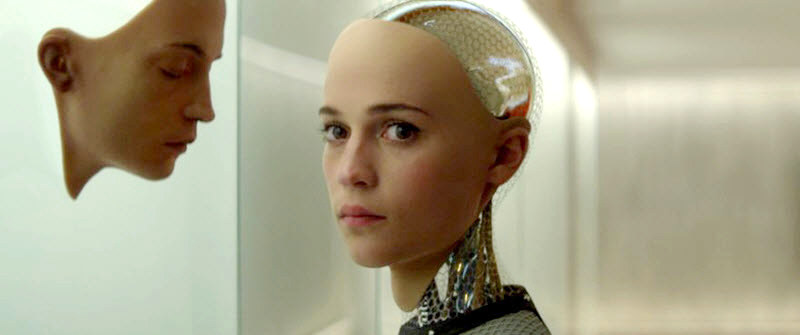


My Ratings: Moral rating: Better than Average / Moviemaking quality: 5